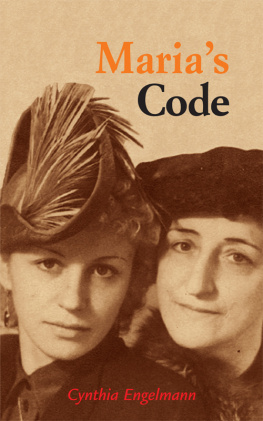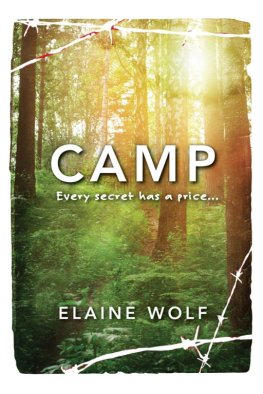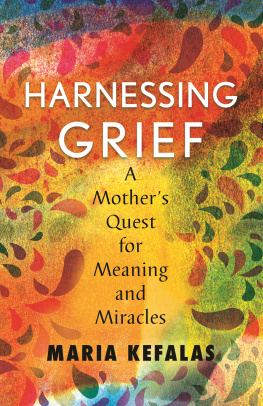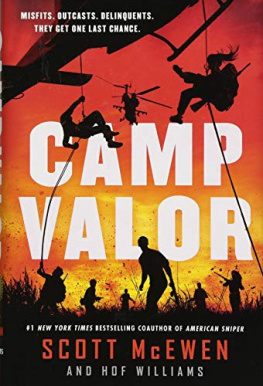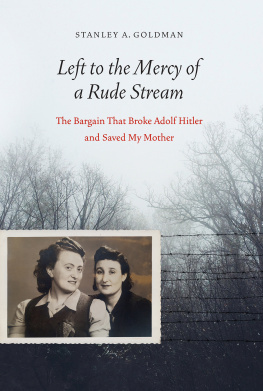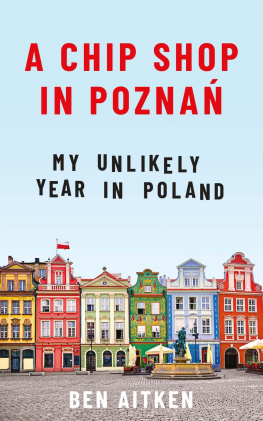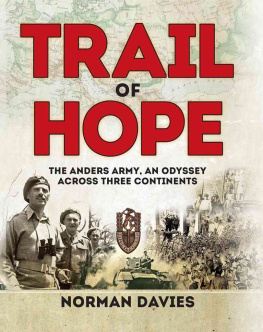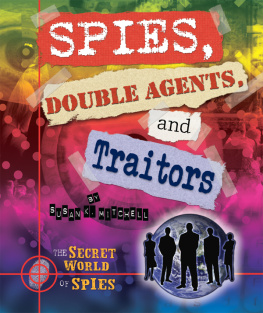
www.grosvenorhousepublishing.co.uk
Introduction
Marias Code includes two biographical accounts that are intrinsically related to each other. Marias Story was the primary inspiration for Safari to Poland.
Shortly before she died in 1986, Maria gave the manuscript for her book to the author. After translation from German into English, the text revealed an extraordinary story about a young Polish dancer, her relationship with a German officer and her imprisonment in a camp called Poggenburg. Poggenburg at that time was untraceable, suggesting that the story was a dramatic work of fiction. The manuscript gathered dust for nearly a decade.
The quest to discover the truth behind Marias Story began when Norman Davies informed the author that Poggenburg was the German name for a camp that is now known as Zabikowo. He suggested that further information might be obtained by writing to the Zachodni Institute in Pozna.
Safari to Poland was born. In 1995, the author set out for Poland to meet Dr. Marian Woniak, the archivist at the Instytut Zachodni.
Initially, Marias story was regarded as fictional by the archivist but gradually, he realised that the work was no fairy tale and that by investigating the leads that Maria gave, several mysteries about the camp were resolved. No prisoner had left such a full account of life in the camp; none had survived in the camp for as long as Maria and her mother. Did they collaborate with the Germans to protect themselves? The evidence available was inconclusive.
It took several applications to different German archives in order to uncover the military role of Marias German officer. Persistence was rewarded. He turned out to be the crucial factor that made Marias Story possible.
Against the backdrop of the shifting sands of a country emerging from a 45 year occupation by the USSR, Safari to Poland describes a voyage of discovery into the past. Unintentionally, the author found herself part of a movement to collate historical facts about events in Poland that had lain hidden since WWII. In 1995, the oases of information, scattered around Poland were yet to yield the material that had been secreted away from prying eyes. Today, it is possible to find Fort VII and Zabikowo on the Internet and in the last ten years, the Polish story has become less fragmented.
The author owes a great deal to the diligence and enthusiasm of the late dr. Marian Woniak and his colleague Ludwik Misiek. She is also indebted to Dorota Latour and her family, the Augustynek family, Jurek Paczke and Ania Michalska for their generosity, their encouragement and their assistance in scaling a huge language barrier. Lisa Waite translated the manuscript for Liebes, Geliebtes Leben and Patricia Wood insisted on deciphering and typing the mountain of handwritten notes that had accumulated over the years. The contribution of them all is appreciated beyond measure.

Safari to Poland

Dedicated to ALL
victims of ethnic cleansing

1985
The phone had rung late in the evening. The message conveyed the news that Maria had collapsed and was dying.
Please visit her. She is asking for you, the voice begged.
Belinda knew that she must agree. She made hasty arrangements to ensure that the children would be collected from school in the afternoon, and set out the following morning for north Buckinghamshire.
The directions to find the clinic proved to be accurate and two and a half hours later, she parked in a tree lined avenue outside the gates of a low white building that exuded clinical correctness. The blonde receptionist greeted her with a cheerful smile.
Maria Kurzke? Ah yes, room sixteen, the smile remained stuck on her face. Could you take a seat while I enquire whether it is convenient for you to see her? she said, closing the register firmly.
Thank you, said Belinda, becoming aware of the pristine order of the bright decor. She elected to sit in the corner of the sofa. A pile of magazines was stacked in front of her but she preferred to retreat into her own thoughts. Maria was dying; the cancer treatment had not worked. One of her technicolor friends was losing her grasp on life. During the ten years that they had known each other, so much had happened.
It had all started when Belinda had answered an advertisement regarding a horse for sale. She had phoned to be told by a foreign sounding lady, that the owner was out, but if she would be good enough to leave her name and number, she would ring back that evening. The owner did return her call; it was the same voice that had spoken earlier.
Yes, you may come to try the horse she was informed. It seemed that the owner of the voice had done some homework and had actually vetted Belinda. It appeared that her track record was familiar to this stranger and her CV duly approved. It was not normal to check out a customer before a viewing.
She went to see the horse, was knocked to the ground when kicked in the midriff but subsequently bought it. She had also met the voice for the first time.
Her initial impression of Maria was that she had the appearance of a Smersch agent. Her hair was dyed jet-black and cut in a shoulder-length pageboy style. The face of the middle-aged woman was puffy, with small grey eyes that seemed to seek and assess every movement in their focus. Belinda had felt naked.
But in that first encounter, they established a rapport. Maria had a certain panache about her that Belinda found intriguing. She also seemed to have a fathomless knowledge and understanding of horses.
Over the years, whenever there was a crisis in her life, Maria would reach for the phone and pour out her troubles to Belinda. One of her beloved horses had been slashed by an unknown person, her groom was threatening to leave; her landlord was pressing for money. There was always a major panic in the air. And then last year, a lump in her shoulder had been diagnosed as cancer. Maria convinced herself that the doctors were wrong and carried her lodestone in her pocket to protect her against such inconveniences. But the doctors had been right and now she was hospitalised in a private clinic. Maria herself was penniless, but she still had supportive friends.
Maria who was in her mid sixties, had been born in Poland. Since the day they met, Belinda had always known her as a colourful character. At times, she was belligerent and demanding, at others she seemed exceptionally kind and understanding. She had made few friends and many enemies. She was highly self opinionated and this tended to easily upset acquaintances. But she was magic with animals, horses in particular. She understood and empathised with them as she would with small children.
Maria had taken Belindas eight-year old daughter under her wing and amidst much giggling and laughter, had taught her to vault on to her pony and stand on its back while it cantered around the riding school.
Now it was different. Her horses were gone and Maria herself was dying.
Mrs White? Please come this way. The nurse had interrupted her reverie. Belinda grabbed her handbag, rose stiffly to her feet and followed the sturdy figure along the corridor.
Blinta, thank you for coming. Maria looked a long way from dead. Belinda had imagined finding her lying prone, but she was sitting upright with a broad grin on her face and a cigarette in her right hand.
Next page
